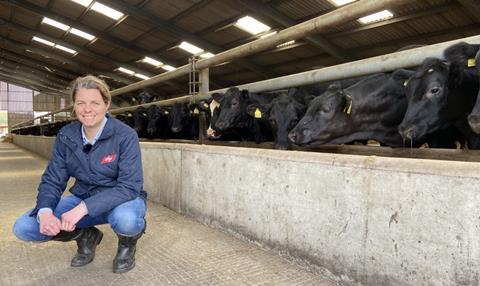ABP Food Group said that the UK red meat industry has demonstrated its determination to reduce farm-originating greenhouse gas emissions (GHGs) by filling all the spaces on a sustainability programme within six months of its launch.

All 350 places on offer for ABP’s PRISM 2030 (Programme for the Improvement in Sustainability of [red] Meat) initiative have been filled, just six months since its launch. During the next three years, ABP’s agricultural team will work closely with the partner farmers to measure, monitor and assess ways to reduce GHGs on farm.
ABP’s PRISM 2030 partners are The Andersons Centre (Andersons), Harper Adams University’s Professor Jude Capper, and the carbon calculator being used is provided by Agrecalc.
"Ultimately our aim is the same as the wider industry, to ensure long-term sustainability of British beef and lamb."
Katie Thorley
ABP’s Agri Sustainability manager Katie Thorley said: “As a business at the heart of the red meat sector, we want to help drive the change needed, and with 90% of agri-supply chain GHGs occurring at farm level, we need to support practical ways for farmers to make the, sometimes simple, changes needed. PRISM 2030 provides us with data to show carbon footprint baselines, and what impact, changes over time, and changes in management, have on GHGs.
"Ultimately our aim is the same as the wider industry, to ensure the long-term sustainability of British beef and lamb and we recently appointed a researcher at Harper Adams to further analyse the results for sharing across the sector.”
As part of the partnership, individual farmers can access monetary grants from ABP’s £250,000 fund, to buy necessary equipment and access practical advice, helping them to reduce their GHGs.
Each farm has the option for confidential benchmarking for both their carbon footprint and enterprise performance. Participants receive a report from Andersons and tailored recommendations on how to make reductions from Harper Adams.
Katie added: “Over 200 farmers have already had their report feedback; recommendations vary from altering genetics, addressing reproductive health issues and improving condition score at breeding, as well as introducing rotational grazing, minimal tillage for crop establishment and monitoring grass growth.
“Research from Harper Adams has shown that, in the UK, 43% of cattle and 58% of sheep hit the required processor specifications, and that finishing cattle earlier and meeting specifications could improve profitability by 45% and reduce the farm’s carbon footprint by 32%.”
Promising results recorded by farmers
Farmer Jamie Price produces beef and lamb in Mid Wales. His PRISM 2030 assessment returned promising results, with his farm recording lower GHG emissions than the national average. He is using this insight to further improve his enterprises and investigate next steps, improving soil health and farmland biodiversity.
He explained: “We need to know our starting point so that we can improve. I think it’s important that consumers can be informed that what they are eating isn’t adversely affecting the environment. It’s vital that the beef and sheep industry keeps up with the times, meaning we, as farmers, should monitor our carbon emissions, PRISM 2030 is a great way to help us do this.”
Cheshire based suckler beef farmer, Ian Norbury, sees PRISM 2030 as a useful tool to support farmers producing red meat, whilst meeting the NFU’s 2040 net zero ambition. He said: “It’s important that as an industry, we produce what the consumer wants, which is now, low carbon, grass fed beef and lamb.”
In 2020, Ian used Agrecalc to calculate his farm’s GHG emissions. He identified ways to reduce emissions, such as planting herbal leys and rotationally grazing cattle, which eliminated fertiliser requirement and improved daily liveweight gains. He now outwinters finishing cattle on bale grazing, only housing calving cows during late winter, minimising straw use and keeping nitrogen on the grazing. Ian joined PRISM 2030 to continue using Agrecalc to monitor emissions, as a result of his feedback, he weighs cattle more regularly, with a higher target spec rate and a goal of reducing cattle finishing age, off grass alone.
Productivity and sustainability go hand in hand
Michael Haverty from Andersons said: “Sustainability and productive performance are not mutually exclusive. Evidence from the PRISM 2030 assessments undertaken to date shows that, in many instances, they are complementary to each other. Key savings are being made by practices like the precision application of fertiliser and more efficient use of feed, bedding, and fuel, which also delivers positively to the business bottom line.
Haverty noted: “Whilst some farms are already performing well in terms of both emissions and cost management, farms that choose to avail of the confidential costs’ assessment can identify savings ranging from £300 to more than £2,500. The savings can be even higher on larger farms."
This story was originally published on a previous version of the Meat Management website and so there may be some missing images and formatting issues.















